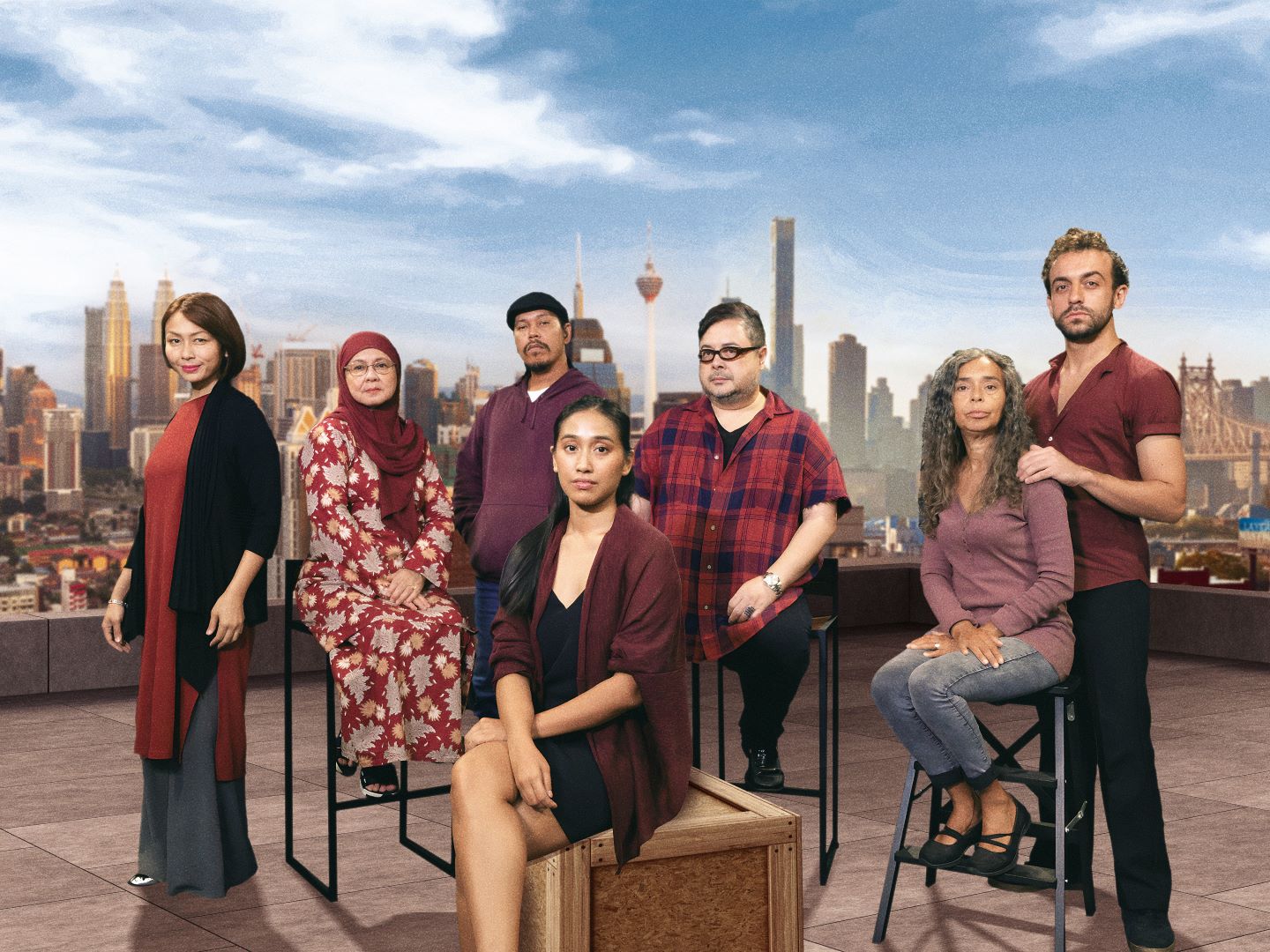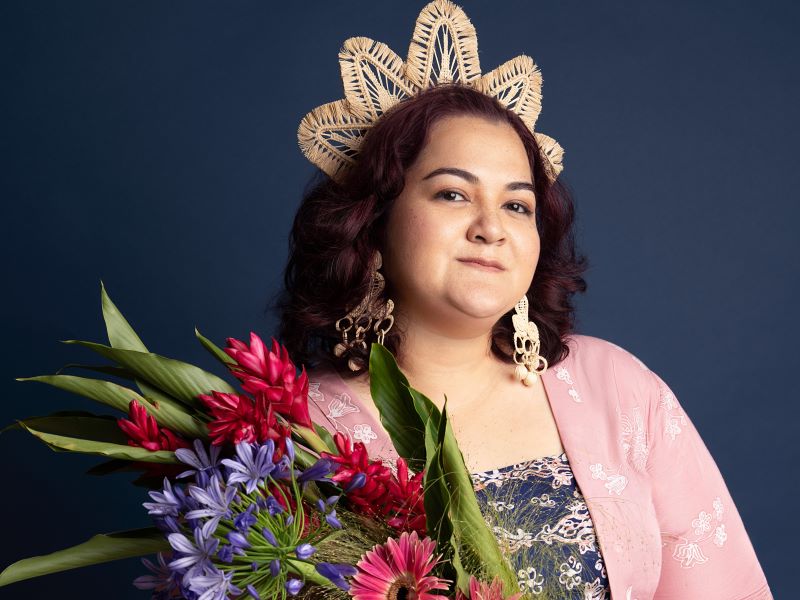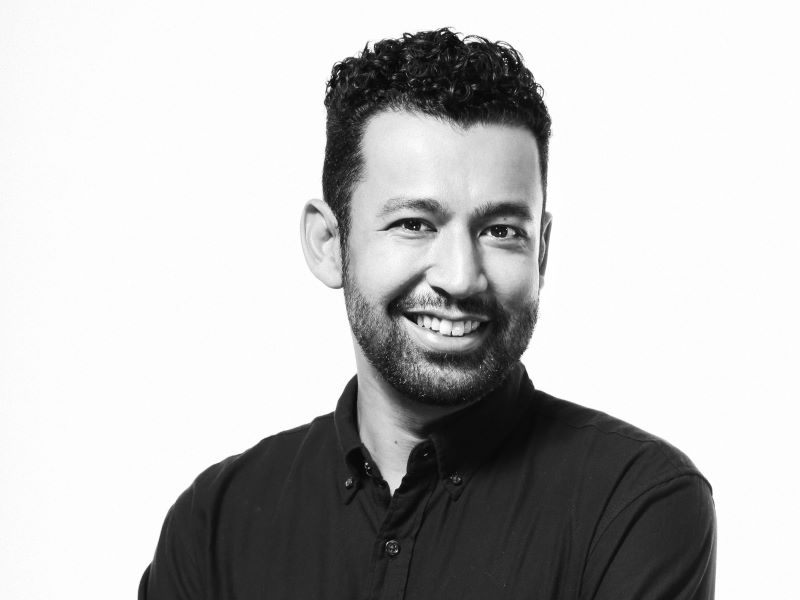
From left: Sabrina Hassan, Fatimah Abu Bakar, Aloeng Silalahi, Reza Zainal Abidin, Catherine Leyow, Xavier Reminick and Putrina Rafie (front). Photo: PJPAC.
The call to pursue theatre reached a crescendo for Adriana Nordin Manan, soundlessly, in 2013. As she stepped out of the lift at the government-linked company where she worked, a voice inside her whispered: “I should be a playwright. Like, really make good on this dream I’ve harboured for more than 20 years.”
Adriana had just returned home after a year pursuing her master’s in politics at New York University in the US. But being a produced playwright, one whose works are staged and not just kept as scripts on her laptop, was her plan way before she thought of a story to tell.
Fault Lines is the realisation of that dream. The full-length play, of which she is also the producer, opens at PJPAC, 1 Utama, Petaling Jaya, on Nov 16.
“It was like a love letter to myself,” she reveals. “I wanted to make sense of the world, anchored in broad themes of belonging, diaspora and difference, when I wrote it.”
Two weeks after she first left for the US to study at 18, terrorists crashed two hijacked planes into the twin towers of the World Trade Center in the financial heart of Manhattan. What followed for her were six bewildering years as she tried to answer questions about identity within a context of cross-cultural differences, forgiveness and self-autonomy.
“I chose to set my play overseas but with mostly Malaysian characters because I wanted to inject elements of the diaspora and the experience of being ‘di negara orang’, which can be quite discombobulating, and add a layer of foreignness and unfamiliarity to it.”
Fault Lines takes place in government-scholar Shereen Rahman’s New York City apartment, where family members have come to visit from Malaysia, bringing more than their physical baggage. “You can say the disruption to routine inside the [unit] is parallel to the unfamiliar, raging and roaring chaos of the outside world of NYC,” Adriana says.
“In Malaysia, my religion was never questioned, but in the US, the combination of being Muslim and from a Muslim majority country during the immediate aftermath of 9/11 was quite unnerving and frightful. I felt very much that I was a minority, one being othered too by the shrill world of media and politics.”
adriana_nordin_manan._credit_sueanne_koh.jpg

She was also much younger and couldn’t make as much sense of the larger dynamics at play. “I just knew it was a confusing time, and while I never felt my life was in danger, I did feel othered and quite clearly that I was just a guest there and should keep my head low and get on with life.”
Fault Lines was 10 years in the making because playwriting is difficult and requires a different mode of thinking and a willingness to be vulnerable that cannot just be switched on and off after office hours. It was also impossible to focus on the play with a regular job, so she quit in 2015.
While the voice stayed in her head, it was only in 2017, after attending Theatre360’s Wordbox playwriting programme facilitated by Sheena Gurbakhash, that Adriana began putting pen to paper. “I belched out a terrible first draft, which I can’t even remember now, and kept going and going and going for six years.”
The script has expanded and a cast of seven — Putrina Rafie and Fatimah Abu Bakar play Shereen and her mother Habsah, who reunite after years of separation; Xavier Reminick, Reza Zainal Abidin, Sabrina Hassan, Aloeng Silalahi and Catherine Leyow — directed by Ghafir Akbar will portray criss-crossing relationships and dynamics.
Five of the seven were part of two main workshops held in 2021 and 2022 on Fault Lines. Adriana roped in Ghafir — they had attended the same theatre workshop in 2017 — “via a combination of my bravado and his empathy and collegiality”. When her script was ready at end-2018, he and several actors gathered in her living room to read it.
She took one look at Ghafir, remembered seeing his directing work before (Language Archive by PH7 Production Management) and blurted out: “Would you direct this play?”
Yes, many times she thought of shutting her laptop, “mocking myself for even thinking I could write a play and moving on with life … If Malaysia had more playwriting programmes or new play development initiatives, perhaps I would have gone through such a route”.
Instead, she had to lean on her own determination and the support of a small circle of friends who helped workshop the play and gave feedback. The Zoom sessions in 2021/22 were “a tender gathering across generations, culture (we had Singaporean and US American actors be part of the cast) and migration experience (a few of us had studied overseas so there was that commonality). It all fed into my thinking and onward revisions of the script”.
At heart, the play is “a corpus of deep, profound reflections on life and humanity that I have cultivated since I was eight years old. Its title is about the sharp, seemingly immutable divisions humans prop up against one another throughout history and in every cultural context. Lines that differentiate us, lines we cannot cross, lines that define the unspoken rules in every society”.
Fault Lines reflects her personal experience — those formative years spent between Malaysia and the US before she got tired of living out of a suitcase and returned home in 2007 to ground herself again and reconnect with friends and family.
ghafir_akbar._photo_credit_ghafir_akbar.jpg

None of the characters are thinly veiled stand-ins for Adriana, who finds she can not only step out of her immediate circumstances and write about other people but also imbue their stories with her observations and interrogations. “My writing doesn’t have to be about me in order to be about me, if that makes sense.”
She had pursued theatre since secondary school, always on the side. “But I was attending shows diligently, making friends with people in theatre and identifying as a theatremaker and playwright-in-progress.”
She considers herself creative, primarily as a writer, and sees the arts as a potent platform to “be in a room with difficult topics while surrounded by gentleness and care”.
The desire to understand how people co-exist, despite the missteps and tensions, drives her art-making, which owes much to her being from a country where people assume things about those different from them.
“Confronting these assumptions feels like catharsis and artistic duty. The layers and dimensions of postcolonialism, diversity, urban chaos and neoliberalism-instigated upheavals also keep me alert and constantly seeking to create.”
Adriana likes stories from countries where the main language is one she does not understand as well as those with quirky characters, humour, wit and a nice dose of earnestness in exploring the human condition.
Storytelling is a way for a people or community to feel seen; thus, tales that centre on underrepresented voices appeal to her. “It’s important to be seen, in a world that seems lopsided in what it deems to be stories worth telling, or not.”
The hardest thing about putting herself out there, she has found, is setting a road map and executing it. Staging a theatre production is a gargantuan task and it is easy to walk away from the thought and relegate it to the bin of projects desired but never completed.
“But my message to anyone considering doing what I’m doing is: Believe in yourself and the story you want to tell. Nobody will be there 24/7 to cheer you on, so you owe it to yourself to never let the fire go out. And, of course, enjoy the journey and know it will change you as a person, for sure.”
Adriana is also a translator, researcher, curator, educator and entrepreneur. Having a string of professional roles is not uncommon because the local arts scene is small and not very developed in terms of career stability and opportunity, she notes. So people multitask.
But she concentrates on one thing at a time. Last year, she had a stint in research. This year, she is focused on playwriting, curation, translation and writing. And 2024 will be about education and entrepreneurship. “I move between roles and at the end of the day, they become accumulated years of work experience and help me grow professionally as a whole.”
In 2021, Fault Lines was a semi-finalist in the International Scratchpad Series by The Playwrights Realm in New York City. The organisers made a global call, after realising things could move online quite seamlessly, to playwrights to submit their works for the chance to have them workshopped by professional directors and actors.
“I didn’t win the workshop opportunity, but The Playwrights Realm wrote me a very encouraging email to inform me of how far I had gotten (out of about 1,000 entries) and said very kind words about the play. It was a tremendous morale boost for me,” Adriana says.
Where will she take her work after this week’s show?
“I haven’t thought of it really; at this juncture I just want it to premiere and enter the world. Even if it doesn’t get staged after this, I will walk away with so much from the entire experience. It really feels like I’m entering a new level of professional conviction and artistic urgency to keep on doing what I do. And that is something money cannot buy.”
'Fault Lines' will run from Nov 16 to 18, at 8.30pm, and on Nov 18 and 19, at 3pm (followed by talkbacks with the playwright and director, and the cast, respectively). Nero Event Space, PJPAC 1, 1 Utama E, PJ. For tickets (RM75, 88 and RM150), visit onetix.com.my.
This article first appeared on Nov 13, 2023 in The Edge Malaysia.


